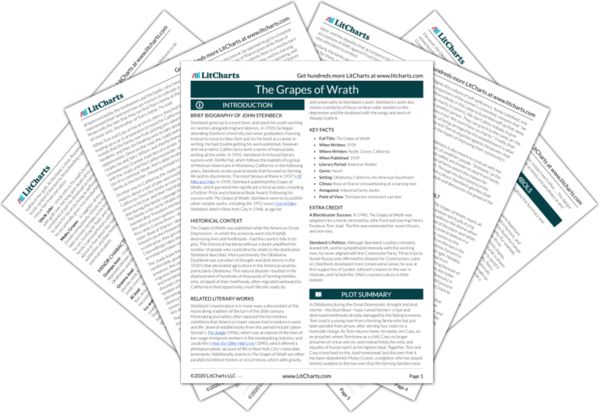Summary
Analysis
Tom Joad, a protagonist of the novel, is introduced. He is young, tall, and weather-beaten. He has just been released from serving a four-year prison sentence for homicide, and he wears the new, ill-fitting suit that was given to him upon his release. Tom has walked to a roadside restaurant to hitch a ride home. He takes a seat on the running board of a truck, even though he notices that the truck bears a “No Riders” sticker.
Tom’s new clothes are an inconvenience, and they contrast sharply with his weather-worn body. By taking a seat on the running-board of the truck in spite of the “No Riders” sticker, Tom shows that he’s self-assured and comfortable breaking rules.
Themes
When the truck driver returns and seems wary of giving Tom a ride, Tom appeals to the trucker: “sometimes a guy’ll be a good guy even if some rich bastard makes him carry a sticker.” The trucker, sensing that he’s being “trapped” by Tom’s words, agrees to let Tom ride.
Tom explains that he’s on his way back to his father’s forty acre farm. The driver is surprised to hear that a forty-acre "cropper" managed to escape the destruction of the dust storms or repossession by landowners. Tom responds that he hasn’t heard any news lately, since he and his father, while literate, don’t write letters to one another.
The driver’s surprised comment foreshadows the discovery Tom will make a few chapters later, when he comes across his family’s abandoned farmhouse, and also makes it clear that nature isn't the only thing the small farmers have to contend with.
Themes
Throughout the ride, the truck driver pressures Tom for more information about himself—his questions “spread nets” and “set traps.” Tom senses this “secret investigating casualness,” and answers the trucker’s questions standoffishly, choosing to remain mostly silent as the driver rambles. The trucker notices Tom’s reticence and explains that the loneliness of life on the road is what makes him so talkative.
Tom’s quiet confidence contrasts with the driver’s insecure babbling. The driver’s reference to the loneliness of life on the road prefigures the long journey to California that the Joads will soon undertake, and it highlights the value of companionship during hard times.
Themes
Get the entire The Grapes of Wrath LitChart as a printable PDF.

Finally, once the truck nears Tom’s destination, Tom acknowledges the driver’s nosiness: “You give me a goin’-over when I first got in. I seen you.” He then explains that he received a seven-year sentence in McAlester prison for homicide; he’s out early on parole. After exchanging goodbyes, Tom gets out at a dirt road and the truck pulls away.
With this candid outburst, Tom shows that he doesn’t much like deception. Tom’s willingness to tell the driver about his time in jail shows that he isn’t ashamed of his past.
Themes












